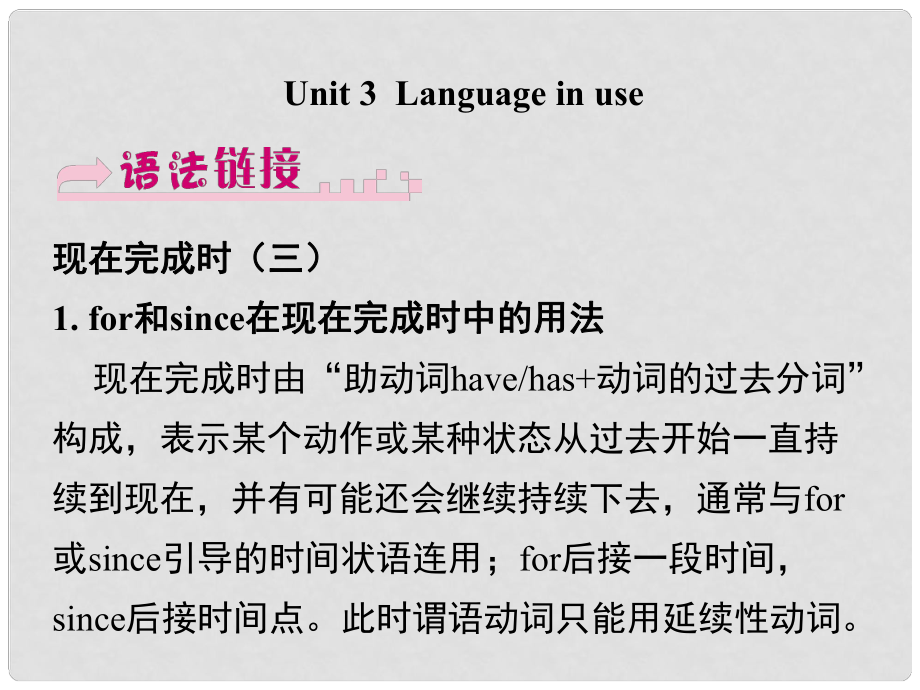《浙江省嘉興市秀洲區(qū)八年級(jí)英語(yǔ)下冊(cè) Module 4 Seeing the doctor Unit 3 Language in use課件 (新版)外研版》由會(huì)員分享�����,可在線閱讀�����,更多相關(guān)《浙江省嘉興市秀洲區(qū)八年級(jí)英語(yǔ)下冊(cè) Module 4 Seeing the doctor Unit 3 Language in use課件 (新版)外研版(19頁(yè)珍藏版)》請(qǐng)?jiān)谘b配圖網(wǎng)上搜索���。
1�����、Unit 3 Language in use現(xiàn)在完成時(shí)(三)現(xiàn)在完成時(shí)(三)1. for和和since在現(xiàn)在完成時(shí)中的用法在現(xiàn)在完成時(shí)中的用法 現(xiàn)在完成時(shí)由“助動(dòng)詞have/has+動(dòng)詞的過(guò)去分詞”構(gòu)成�����,表示某個(gè)動(dòng)作或某種狀態(tài)從過(guò)去開(kāi)始一直持續(xù)到現(xiàn)在���,并有可能還會(huì)繼續(xù)持續(xù)下去��,通常與for或since引導(dǎo)的時(shí)間狀語(yǔ)連用��;for后接一段時(shí)間�����,since后接時(shí)間點(diǎn)�。此時(shí)謂語(yǔ)動(dòng)詞只能用延續(xù)性動(dòng)詞���。 具體用法如下:(1)“for+一段時(shí)間”與現(xiàn)在完成時(shí)連用時(shí)�,表示某事持續(xù)了多長(zhǎng)時(shí)間��。如: I have had the book for three months. 這本書我已經(jīng)買了三個(gè)月了。 She h
2���、as taught us English for two years. 她已經(jīng)教了我們兩年的英語(yǔ)了����。 (2)since引導(dǎo)的時(shí)間狀語(yǔ)也可與現(xiàn)在完成時(shí)連用���,表示事情從過(guò)去的某個(gè)時(shí)間開(kāi)始持續(xù)到現(xiàn)在�。since作介詞時(shí)�����,意為“從以來(lái)�����;自以后”��,其后接時(shí)間點(diǎn);since也可作連詞�,用于引導(dǎo)時(shí)間狀語(yǔ)從句����;since還可作副詞,意為“從那以來(lái)��;自那以后”����。用法為:1)since+過(guò)去的某一時(shí)間點(diǎn);2)since+一段時(shí)間+ago�����;3)since+時(shí)間狀語(yǔ)從句�����。如: He has been in China since 2002. 他自2002年就在中國(guó)�。 Ive been a soldier since
3����、two years ago. 我兩年前就成為了一名士兵。 I have lived here since I came to Wuhan. 自從來(lái)到武漢我就住在這里�。 【注意】(1)對(duì)for和since引導(dǎo)的時(shí)間狀語(yǔ)提問(wèn)時(shí)要用how long。如: How long have you had your camera? 你買了這部相機(jī)多長(zhǎng)時(shí)間了��?(2)固定句型:Its+時(shí)間段+since從句(從句用一般過(guò)去時(shí)),意為“自從已有多長(zhǎng)時(shí)間了”��。如: Its three years since the old man died. 那位老人已過(guò)世三年了����。 2. 動(dòng)詞的延續(xù)性與短暫性動(dòng)詞的延續(xù)性與短暫性
4、在現(xiàn)在完成時(shí)的句子中��,如果含有for和since引導(dǎo)的時(shí)間狀語(yǔ)從句���,肯定句和疑問(wèn)句中的謂語(yǔ)動(dòng)詞必須是延續(xù)性動(dòng)詞�。反之����,需將短暫性動(dòng)詞變?yōu)檠永m(xù)性動(dòng)詞。試比較: 他入團(tuán)兩年了����。 He has joined the League for two years. (誤) He has been a member of the League for two years. (正) 我買這輛自行車三年了。 I have bought this bike for three years. (誤) I have had this bike for three years. (正) 歸納總結(jié):常見(jiàn)的短暫性動(dòng)詞所對(duì)應(yīng)
5���、的延續(xù)性動(dòng)詞(詞組): buyhave; borrowkeep; begin/startbe on; gobe away; diebe dead; joinbe in/be a member of; leavebe away from 3. have been to, have gone to和和have been in的區(qū)別的區(qū)別 (1)have been to表示“曾經(jīng)去過(guò)某地”��,指現(xiàn)在已經(jīng)不在那里了�����,可與just, ever等詞連用���;后面還可跟表示次數(shù)的詞����,表示“去過(guò)某地幾次”�。如: Have you ever been to Hangzhou? 你曾經(jīng)去過(guò)杭州嗎? Ive been t
6�、o Beijing three times. 我去過(guò)北京三次。 (2)have gone to表示“到某地去了”����,指到了某地或正在去某地的途中。說(shuō)話時(shí)該人不在現(xiàn)場(chǎng)�����,一般不用第一�����、第二人稱代詞作句子的主語(yǔ)����。 Where is Tom? 湯姆在哪里? He has gone to the bookshop. 他去書店了�。(3)have been in意為“在某地”,常與表示一段時(shí)間的狀語(yǔ)連用�。如: Mr Brown has been in Shanghai for three days. 布朗先生在上海待了三天了?����!驹掝}呈現(xiàn)話題呈現(xiàn)】 本模塊以健康為話題�����,以看病為主題�����,涉及病情描述和治療建議�。要求
7、學(xué)生能夠根據(jù)圖片提示寫關(guān)于健康生活的短文��,能夠針對(duì)不健康的生活習(xí)慣給出恰當(dāng)?shù)慕ㄗh�����。學(xué)生可以從健康的重要性、目前的健康狀況���、生活中存在的健康問(wèn)題��、如何解決健康問(wèn)題等方面著手寫作�����?���!炯丫渌C萃佳句薈萃】How can I help you?要我怎么幫你?I have got a stomachache. 我胃疼����。How long have you been like this?你像這樣多長(zhǎng)時(shí)間了?Since Friday.從周五開(kāi)始�����。I have been ill for about three days.我病了大約三天了�����。Have you caught a cold? 你感冒了嗎�����?Let me t
8�、ake your temperature.讓我給你測(cè)測(cè)體溫吧。That is the problem!那就是問(wèn)題所在����!You spend too much time in front of the computer.你在電腦前花的時(shí)間太多了。It can be very harmful to your health.它可能對(duì)你的健康有害�。It is not serious. 它不嚴(yán)重。Ill give you some medicine.我會(huì)給你一些藥�。Take the medicine three times a day.每天吃三次藥。I was not feeling very well.
9���、我感覺(jué)不舒服���。I get exercise by taking my pet dog for a walk. 我通過(guò)遛寵物狗來(lái)鍛煉身體。We all feel fit. 我們都感覺(jué)健康�。She also takes part in the training with us. 她也和我們一起參加訓(xùn)練。She is in excellent condition too.她身體狀況也很好���。It has become part of my life.它已成為我生活的一部分��。I arrive at work with a smile on my face.我面帶笑容去上班��。I do not enjoy
10��、running. 我不喜歡跑步�����。(21)I feel awful. 我感覺(jué)不舒服�。(22)Perhaps I am too weak to do any exercise.也許我太虛弱而不能鍛煉?�!緦懽魅蝿?wù)寫作任務(wù)】 據(jù)權(quán)威調(diào)查顯示����,我國(guó)中學(xué)生的體質(zhì)正逐年下降,最主要的原因是學(xué)生長(zhǎng)時(shí)間面對(duì)繁重的課業(yè)負(fù)擔(dān)�����,鍛煉時(shí)間不足�,以及攝入不健康的食物。請(qǐng)以“How to Keep Healthy”為題�����,參考提示寫一篇英語(yǔ)短文來(lái)描述一下如何保持健康。 提示要點(diǎn):早睡早起��,不熬夜�;加強(qiáng)體育鍛煉;不要長(zhǎng)時(shí)間玩電腦和手機(jī)�����;盡量少吃垃圾食品���。 要求:1. 語(yǔ)言通順,行文連貫����,內(nèi)容充實(shí);2. 80詞左右�����?!緦懽髦笇?dǎo)】
11����、 現(xiàn)在來(lái)完成文章的提綱和主要內(nèi)容。文章可以分為三部分:Beginning保持健康很重要:As we know, it is very 1 to keep healthy.Body提出建議:should do: 2 early and get up early; do more 3 ;shouldnt do:4 too late; spend too much time on the 5 and the mobile phone; eat junk foodEnding表達(dá)愿望:I hope all of us can have a healthy lifestyle and be health
12��、y. Go to bedimportantexercise Stay up computer【自主創(chuàng)作】 How to Keep Healthy 【范文展示】 How to Keep Healthy As we know, it is very important to keep healthy. Here is some advice on how to keep healthy. First, you should go to bed early and get up early. Never stay up too late. Second, do more exercise, such as walking, running and swimming. Third, eat less junk food. It is harmful to our health. Last but not least, dont spend too much time on the computer or the mobile phone. I hope all of us can have a healthy lifestyle and be healthy.
 浙江省嘉興市秀洲區(qū)八年級(jí)英語(yǔ)下冊(cè) Module 4 Seeing the doctor Unit 3 Language in use課件 (新版)外研版
浙江省嘉興市秀洲區(qū)八年級(jí)英語(yǔ)下冊(cè) Module 4 Seeing the doctor Unit 3 Language in use課件 (新版)外研版

